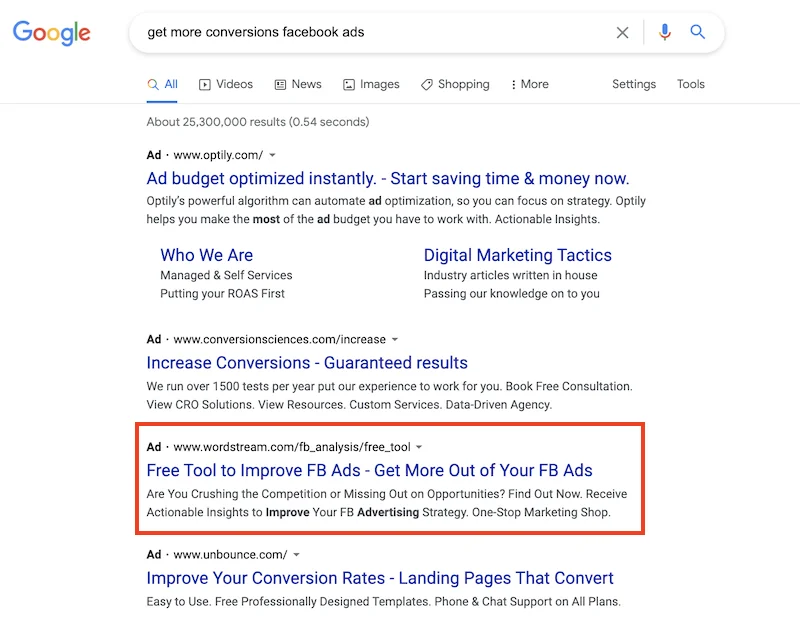PPC marketing is a great way to expose your company and product to interested customers. In the PPC (pay-per-click) marketing model, part of an inbound marketing strategy, an advertiser bids on certain keywords that users type into search engines, in order to display a related ad to those users, hopefully drawing them in to the advertiser’s site.

An example of PPC ads on the SERP.
For example, an online pet store owner may bid on the keyword “dog collars.” When a person searches for dog collars via Google or another search engine, the owner’s ad may be triggered. What determines if and in what position the ad appears in the sponsored links on the search engine results page (SERP)? A combination of the bid and the ad’s Quality Score, which is a measure of:
- How relevant the ad is to the keyword,
- How relevant the ad is to the landing page it sends the searcher to,
- How relevant the ad is to other pay-per-click keywords in its ad group,
- The click-through rate (CTR) of the ad, and
- The historical performance of the account,
among other factors. In short, a successful PPC search marketing campaign requires highly relevant ads and ad groups.
That may sound simple, but there’s actually a lot of work that needs to go on in the background to ensure a high degree of relevancy across a wide range of PPC keywords. And you need a wide range of keywords if you want to capture a broad audience (and customer base).
Bottom line? Your PPC marketing results will only be as effective as your marketing strategy. If you want continuous profits and growth, you need to continuously improve your PPC campaigns.
Continuous Keyword Research for Ongoing PPC Marketing Results
The foundation of any PPC search engine marketing campaign is keywords. You need to develop a list of keyword phrases related to your business offering so you can get your name out there in front of people looking to buy what you sell. This starts with keyword research, which you can accomplish in a number of ways and with a number of search marketing tools.
Most of the available keyword tools, however, are built for one-time use. Take Google’s keyword suggestion tool—PPC marketers use it to generate a list of keywords, export that list into an Excel spreadsheet and then update it infrequently, if ever.
The problem with this approach is that search trends are always changing. What’s popular today may not be popular in a month or two, and if you never update your keyword research you’ll miss out on all kinds of possible variations. In addition, if you don’t update your list, it can’t expand. Keyword expansion and aggregation are crucial if you want your PPC marketing results to improve over time, rather than stay the same or worsen.
So Many Keywords! How to Group & Organize for PPC Marketing Success
With a large keyword database that’s continually growing larger, you can’t afford to just plop everything into a spreadsheet and hope for the best. You need an effective way to organize your keywords. And segmenting your keywords into tight, relevant groups is an extremely important aspect of keyword organization. Remember that relevance is the key to high Quality Scores and strong PPC marketing ROI. When you group your keywords by relevance, you’re setting yourself up for success, because:
- It’s easier to write relevant, targeted ad copy around small, tightly organized keyword groups.
- Small segmentations encourage bidding on narrower keywords, which are less competitive and less costly—and also attract more qualified searchers.
- When your ads are more specific and relevant to the keyword, your click-through rate improves, which also has a positive effect on Quality Score.
These are just a few of the ways that search engines reward PPC marketers who group keywords intelligently. But if you’ve got thousands, hundreds of thousands or even millions of keywords for PPC search engine marketing purposes, proper organization gets really difficult really fast—at least in a typical spreadsheet application.
Check out are free resource on keyword grouping to learn how to group keywords effectively. It’s a task that will save your team a ton of time and effort than can be better spent on more strategic paid search marketing tasks. With WordStream pay per click company, your PPC campaigns will grow in size, relevance and value, reducing the time and money you spend on SEM and PPC marketing.
Learn More, Get PPC Marketing Tips
Learn more ways to increase your productivity as a PPC marketer while improving your overall small business marketing strategies: Download our free white paper on PPC best practices and PPC marketing tips. We also have a fantastic collection of AdWords ebooks that you can download for free.


0 Comments